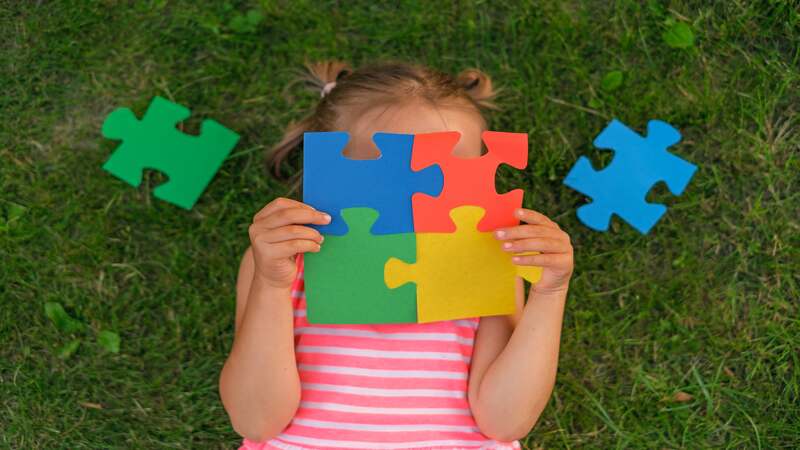
Want to keep your toddler engaged in some game that will facilitate their brain development? Then, the answer lies in puzzles. Multiple puzzle variations are suitable for different age groups, cultivating your kid’s cognitive abilities. The benefits of puzzles for preschoolers are many. The most significant is that it prepares them for their upcoming school years.
In a study published by the University of Chicago, researchers found that the interaction between the toddler and parent while solving puzzles helps the little one acquire spatial languages (1). It also helps to improve memory, decision-making skills, and IQ in preschoolers. To know more about the benefits of puzzles, read along.
What Are Puzzles?

Puzzle is a game that is fun for toddlers as well as adults. They come with different themes and variations, making them exciting for the players. Age-appropriate puzzles can help toddlers subtly develop their cognitive abilities and intelligence (2). Puzzles are also an easy way for tiny tots to learn the basic ideas of numbers, alphabets, and shapes.
When to Introduce Puzzles to Toddlers?
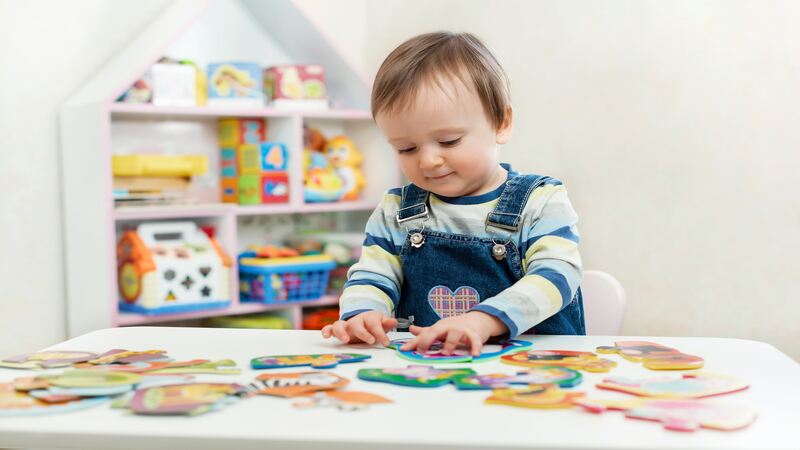
Your 1-year-old toddler will like to explore things, blocks, and shapes. Hence, you can introduce them to simple and age-appropriate puzzles. At 13-24 months, the little ones learn to do trial-and-error, so they develop the ability to place puzzle pieces (3). Therefore, at the end of 2 years, your toddler will recognize the basic puzzles. They also start developing problem-solving skills by this time. If your little one is three, you can try multiple types of puzzles to aid their motor skill and brain development.
Different Types of Puzzles
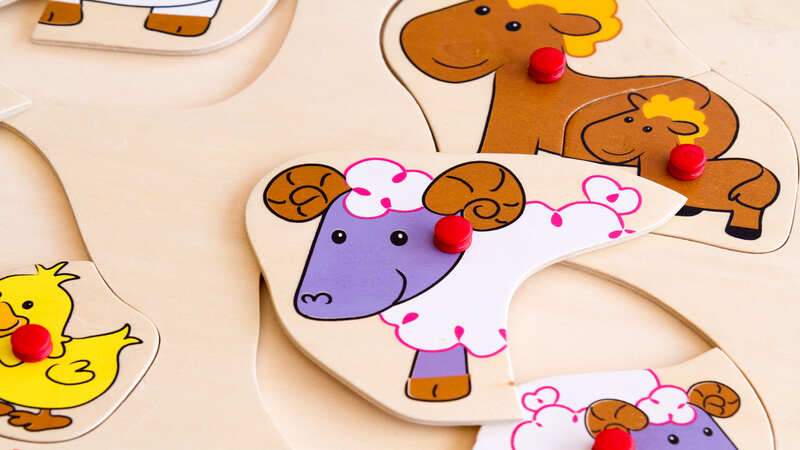
There are various kinds of puzzles available for kids. You need to see your toddler’s interest and choose accordingly. Start with simple puzzles and then as they get comfortable, maybe move on to slightly complex ones. The different types of puzzles for toddlers are-
1. Chunky Puzzle:
This puzzle includes about 4-12 colorful chunky pieces the toddler needs to pick up with their hand. These puzzles strengthen their hand muscles while familiarizing them with object shapes and names.
2. Peg Puzzle:
This type of puzzle is ideal for preschoolers. The puzzle comes with 8-26 puzzle pieces, having small pegs that help improve the motor skills of your little one. They come in numbers, alphabets, and animal themes that assist them in fundamental learning.
3. Frame Puzzle/Jigsaw Puzzle:
Frame puzzles are beginner-stage puzzles with an outer frame. These puzzles are mostly image-based. The number of pieces and themes vary.
4. Floor Puzzle:
These are bigger. Hence, you lay them on the floor. Moreover, these are suitable for your preschooler as they help develop problem-solving skills.
5. Two-piece Matching Puzzle:
Here, you get an image divided into two or three pieces, and your little one can learn how to match one part with the other. They can solve this puzzle smoothly. Moreover, it also allows you to familiarize your toddler with puzzles.
Benefits of Puzzles For Preschoolers
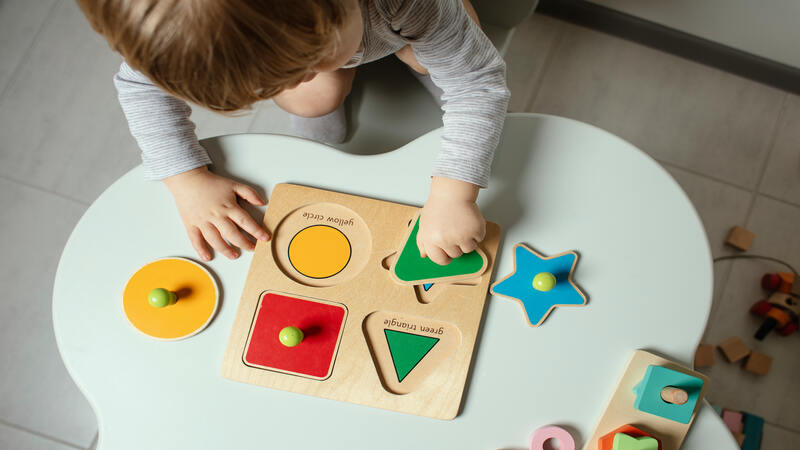
Puzzle is not just a game that can keep your toddler busy for hours. There are several benefits of puzzles, such as:
- Motor Skills: As they grasp the puzzle pieces, the action can improve the physical abilities of your little one by promoting small muscle and hand-eye coordination (4).
- Cognitive abilities: The toddlers can develop reasoning and decision-making skills while they try to match the puzzle pieces.
- Boosts confidence: The more they get closer to solving the puzzle, the more confident they become. Thus, it boosts their confidence and improves their self-learning experience.
- Improves Social interaction: Puzzle games are necessary for preschoolers as they prepare your toddler for school. Besides promoting self-learning, parent-toddler interaction during puzzle games can help your kid develop social interaction skills.
- Learn basic ideas: Puzzles come in multiple themes, including shapes, colors, numbers, vegetables, and animals. Your enthusiastic little one will learn the basic concepts in no time while playing with puzzles (5).
Are There Any Disadvantages of Puzzles?
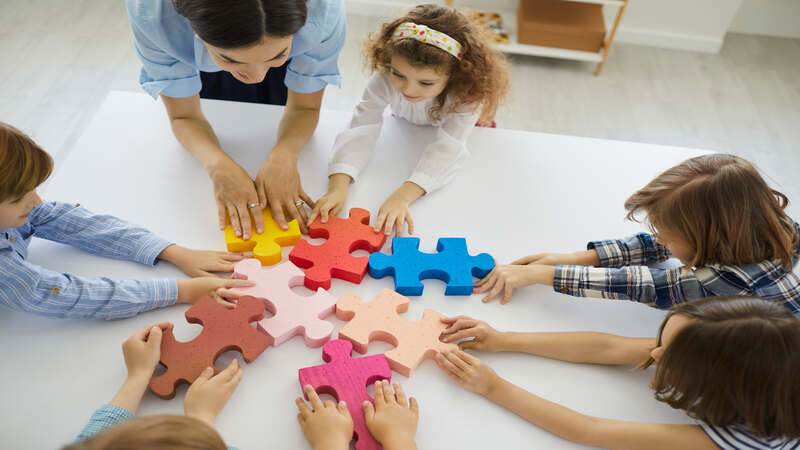
In general, playing with puzzles has almost zero disadvantages. However, for hyperactive little ones and preschoolers, it can be challenging enough to keep them engaged with puzzles for a long time. Playing with puzzles in this condition may not aid the advantages discussed above.
However, many researchers have argued that kids suffering from ADHD must engage in puzzle games because it helps to improve their concentration and helps them become more attentive (6). It is also crucial to choose a suitable puzzle for your preschooler. Otherwise, the complexity can kill their interest.
As a highly recommended educational game, puzzles are suitable for toddlers, starting from the age of one. You can feed their curiosity with colorful puzzles of multiple themes. They can learn basic ideas of alphabets and numbers even before attending school. Puzzles keep them busy for hours, making them confident, logical, and intelligent.
FAQ’s
1. How do Puzzles Help The Brains of Kids?
Puzzles improve the cognitive skills and patience of toddlers. Puzzle is an engaging activity that promotes concentration and boosts memory.
2. Do Puzzles Help Intelligence?
While solving puzzles, a toddler can acquire the power of observation. Puzzles boost their memory development and concentration. Puzzles also help with the brain coordination of your little one.
3. Why Should Preschoolers do Puzzles?
Playing with puzzles impacts a preschooler’s physical as well as cerebral development. Their motor skill and coordination of small muscles improve as they engage with puzzles. Puzzles can boost memory, promote self-learning abilities and observation skills, and improve concentration.
References
- Levine SC, Ratliff KR, Huttenlocher J, Cannon J. Early puzzle play: a predictor of preschoolers’ spatial transformation skill. Dev Psychol. 2012 Mar;48(2):530-42. doi: 10.1037/a0025913. Epub 2011 Oct 31. PMID: 22040312; PMCID: PMC3289766. – https://www.ncbi.nlm.nih.gov/pmc/articles/PMC3289766/
- Pratiwi¹, Rita & Andriati¹, Riris & Purnama, Fenita & Indah², Sari & Dwipratiwi, Rita. (2020). THE POSITIVE EFFECT OF EDUCATIVE GAME TOOLS (PUZZLE) ON COGNITIVE LEVELS OF PRE-SCHOOL CHILDREN (4-5 YEARS). – https://www.researchgate.net/publication/340428618_THE_POSITIVE_EFFECT_OF_EDUCATIVE_GAME_TOOLS_PUZZLE_ON_COGNITIVE_LEVELS_OF_PRE-SCHOOL_CHILDREN_4-5_YEARS
- raisingchildren.net.au – https://raisingchildren.net.au/toddlers/play-learning/play-toddler-development/thinking-play-toddlers
- Kusnanto, Kusnanto & Prajayanti, Eska & Harmayetty, Harmayetty. (2017). Jigsaw Puzzle Improve Fine Motor Abilities of Upper Extremities in Post-Stroke Ischemic Clients. Jurnal Ners. 12. 142. 10.20473/jn.v12i1.2790. – https://www.researchgate.net/publication/318593272_JIGSAW_PUZZLE_IMPROVE_FINE_MOTOR_ABILITIES_OF_UPPER_EXTREMITIES_IN_POST-STROKE_ISCHEMIC_CLIENTS
- Bjørn Petter Jelle1, Norwegian University of Science and Technology (NTNU), Department of Civil and Environmental Engineering, Trondheim, Norway. SINTEF Building and Infrastructure, Department of Materials and Structures, Trondheim, Norway. DOI: 10.4236/ce.2017.813137 – https://www.scirp.org/journal/paperinformation?paperid=79662
- Slideshow: ADHD in Children, Medically Reviewed by Poonam Sachdev, MD on March 04, 2024 – https://www.webmd.com/add-adhd/childhood-adhd/ss/slideshow-adhd-in-children

